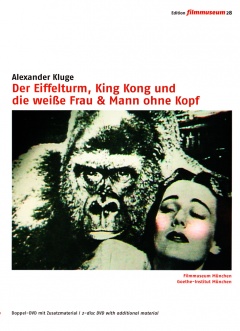The Eiffel Tower, King Kong and the White Woman & Headless Man
CHF 26.00 / EUR 23.00The Eiffel Tower, King Kong, and the White Woman: A typical magazine from the start-up period of the independent television window in private broadcast TV. All traditional possibilities for expression in film and many types of television are experimented with: Editing, collage, multiple exposure, narrative interlacing. It deals with the opera, the French Revolution, the Eiffel tower, hit songs from 1932, and Walter Benjamin.
Headless Man: Ballads and murder ballads are elemental narrative styles that are the precursor to the cinema. They relate destinies and emotion. A tiger saves a young maiden from a Turkish man; a stepmother kills the child she was entrusted with. But how do you tell about the construction work at dusk in the ruins of the Twin Towers or about Amok? Additional texts from his work at television in the booklet and as ROM features.
The African Woman or Love With a Deadly Finale, 1988 (24')
The Guillotine or the Category of Suddeness, 1988 (24')
The Eiffel Tower, King Kong and the White Woman, 1988 (24')
Artifacts of Advertising, 1988 (24')
The Pilot's Song, 1988 (22')
Wild Night with Moon, 1990 (14')
Headless Man, 2007 (2')
What Is the Origin of the Song «The Flag on High?», 1994 (9')
The Time, That Must Pass Before an Audience Takes the Initiative, 2007 (4')
Stop, Stranger, and Read, 1996 (15')
Only God Witnesses, 2002 (12')
N.Y. Ground Zero, 2002 (2')
Preying Angel, 2007 (1')
The Sinking of the Titanic, 2003 (15')
As Long As the Sheet Music Lasts , 1994 (2')
The Revenge of the Betrayed Bride, 1994 (13')
The Inseparable Nine, 2007 (3')
Amok. The End of Empathy, 2002 (45')
12 page booklet and ROM features for downloading
Edition Filmmuseum 28 – Double DVD
Language Deutsch Subtitles english, français, español, português
Screen 1:1.37 - 4/3 PAL Sound DD 2.0 (mono) FSK 14+ Region code All regions
Combinaisons préférées
-
DVD Edition Filmmuseum
One of the most important films of the Weimar Republic - with Asta Nielsen and Greta Garbo
-
-
-
-
-
-
DVD
Un film engagé sur l'impunité qu'apporte le pouvoir - inspiré d'un fait réel
-
-
-
-
-













